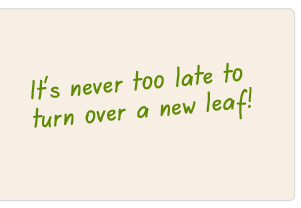Consider using a Time Timer. Learn more about it in PR Newswire’s Seven Practical Tips for Making 2018 The Year You Get Organized and Manage Time.
Posts Tagged ‘planning’
Here is a GREAT Deal for you!
If organizing your home is on your to-do list for 2018, take advantage of this offer.
Contact A New Leaf by February 15, 2018, and let us help you get organized.
Pay for 3 hours and receive a 4th hour at no charge!
Freezer Content Checklist!

Create a Freezer Inventory list, and keep it close to your freezer. That way you’ll know what’s in your freezer.
Check out 20 Household Items You Didn’t Realize Had Expiration Dates.
POC Conference 2017 and more!
What’s Happening? Click Here
In early November, I was in Toronto to attend the annual Professional Organizers in Canada conference. It was filled with learning, networking, catching up with organizing colleagues I hadn’t seen in a year or two, meeting new professional organizers and enjoying great food!

Countdown to Christmas!

“He’s making a list, He’s checking it twice …” Even Santa is a list maker!
The countdown to the holidays has begun. Don’t stress! A small amount of planning now can provide you with more time for those extra chores on your list in the coming weeks.
Check out these archived blog posts if you need some help getting started.
Planning for the Holidays – Part 1 and Part 2
Introducing Georgina Forrest from Smartworks!
The Super Simple Secret To Getting Stuff Done!
When you look around, do you see evidence of incomplete commitments, projects, tasks and “I’ll deal with that later” piles?
Do you wonder how on earth you are EVER going to get it all done?
If you answered yes to these questions, you’re not alone.
Now, let me ask you this: are you as tired as I am about hearing from the ‘experts’ on how to get this stuff done? You know … write down your goals, prioritize them, set dates and schedule them in your planner … yadda yadda blahdey blah.
Are you thinking what I’m thinking?
Boooooooooooooooorrrrrrrrriiiiiiiiiinnnng!
Not that this isn’t good advice, and there’s no denying we wouldn’t ALL benefit from following these practices, but for some people this is the stopping point in the whole process of getting stuff done.
It may just be too complicated and structured for some of you … right now.
We live and work in a time where there’s much more to do than we have time to do it. It’s the reason it’s more critical today, than ever before, to find simpler ways to stay on top of our ever-expanding workloads.
Want to know my super simple secret to getting stuff done?
I set time limits and I limit the amount of stuff I can reasonably do.
Yup. It’s that easy.
Before you toss this idea out, think about it for a moment.
If you knew you had a set amount of time to work on something, how likely is it you’d get down to the crux of the work and eliminate the superfluous stuff?
For example, how ruthless are you the day before you leave for vacation? Suddenly many tasks and commitments don’t appear to be nearly as important as you thought when it seemed you had time available to do it.
And if you limited the amount of commitments and stuff to do, wouldn’t your workload get a bit lighter? Thereby giving you more time to work on the REALLY important stuff?
I think so.
Time management doesn’t need to be a complicated, step-by-step process. It can be as easy as setting time limits and limiting how much you can reasonably get done.
It’s time to GET REAL!!
You are not Superhuman – you cannot get it all done at the pace you’re currently working at. And an endless amount of ‘time’ is NOT going to suddenly drop down into your life.
You need to start doing something – anything – to get that stuff done quickly.
So, what can you limit today? Do it. Get more done.
Now, get on with your day!
Georgina Forrest owns and operates Smartworks! in Red Deer, Alberta. Smartworks! specializes in helping people learn the principles of organizing and developing good work practices, so they can work in the kind of stress-free environment that they’ve always dreamed of. Additional services include getting your office and computer organized and functional, enhancing your productivity and time management through coaching, and process improvement and/or development.
Organizing Your Pantry

It’s mid-November already–time for hats, scarves, warm woolly mittens and boots–as snowflakes start to appear!
Preparing food and baking are on many people’s to-do lists over the next six weeks. The pantry is one of the most well-used areas of your kitchen, so it’s important to keep it organized.
ORGANIZING YOUR PANTRY
Dictionary.com defines a pantry as “a room or closet in which food, groceries, and other provisions, or silverware, dishes, etc., are kept” or “a room between the kitchen and dining room in which food is arranged for serving, glassware and dishes are stored, etc.” Perhaps you’re fortunate enough to have a walk-in pantry. Many of us likely have designated several cupboards to store pantry items.
Since many food items have best before dates, it’s helpful to follow the First In, First Out principle. Use the oldest items first. When unpacking groceries, place new items behind the older items. This seems like it should be common sense, but I’m surprised how many clients don’t do this. When cleaning out and organizing a kitchen, a great deal of food often gets thrown out. Food waste is at an all-time high.
Here are some suggestions:
- Group like items together–tea/coffee, baking supplies, spices, etc.
- Use containers to hold small items.
- Cereal, rice, pasta, flour, sugar and bulk items can be stored in see-through containers (available at dollar stores).
- Can dispensers, stepped shelf organizers and Lazy Susans can be used.
- Keep frequently used items on shelves that allow easy access.
- Use open containers for children’s snacks.
- Label containers so everyone can find items easily.
- Put a date on items and/or containers.
- Can you store appliances in your pantry to keep your countertop clear?
- Matching baskets or containers will make your pantry look tidier.
- Purge your pantry on a regular basis–just before green bin or garbage day.
Remember – Buying items in large quantities is only practical if you have the space to store them.
If you reorganize your entire pantry, you may need to make a few adjustments. There is no one right solution!
Get started and turn over another leaf!
Until next month,

How to Become Exceptionally Successful

A University of California, Berkeley, study “found that on average, office workers go only 11 minutes between interruptions, while it can take up to 25 minutes to get into a state of productivity called flow.” Check out Elle Kaplan’s You Need to Give Up These Toxic Habits If You Want to Be Exceptionally Successful.
Ask yourself, “How can I be more productive?”
6 Stages of Change… with Judith Tremblay
STAGES OF CHANGE
Perhaps it’s the change in weather that’s brought this on, but I’ve been hearing from many people lately about their wanting to change, not able to change, unwilling to change, needing to change, being afraid to change. Whether you are thinking of ending an unhealthy relationship, changing the way you eat, changing jobs or giving up an addiction, it may help you to become aware of the stages of change.
There are six stages of change. The first is the “Pre-contemplation” stage. At this point, you are really not aware that you have a need to change. You will find yourself rationalizing your behaviour, defending yourself against the need to change or maybe even blaming someone else for the situation in which you find yourself.
Second is the “Contemplation” stage. This is when you start to think there may be a problem that needs to change. You become curious and start looking for information. You may develop an urge to gain more insight into what is happening, perhaps developing a desire to make a change. This is where most people procrastinate. It is a good idea to ensure you have developed good stress management skills to handle any stress that may arise from this point and beyond.
The third stage is the “Preparation” stage. You seriously begin to look at options to make the change. Your view is changing from the past to the present as you become ready to make new choices. You might talk with others about how they accomplished the change you wish to make. You will work through the obstacles in your path and the challenges you may face. Change is becoming a priority. You develop a plan to make the change. This is a time of decision making and commitment to change.
Now you have arrived at the fourth stage – the “Action” stage. You work through the old thoughts, feelings and behaviours that kept you stuck. You will probably ask for help to work through the painful emotions, the hurt and the effort to make the change. People will notice that you are changing. Sometimes, people in your life will not like the changes you are making, and you will get “change back” messages. You might need help to resist going back to the old behaviours, to keep making progress.
After the Action stage is the “Maintenance” Stage. In this stage, you are moving towards a healthy balance, re-evaluating your new behaviours and making necessary adjustments along the way. You have developed new, healthy habits. However, you must remain vigilant in order not to revert back to your old behaviours.
You have now arrived at the stage where your new habits are established and no longer require the same amount of vigilance. Make sure you give yourself a reward for your accomplishment and continue to practice the new behaviour!
Paths to Change provides one-on-one counselling as well as coaching to reduce stress, overcome procrastination and become better at self-care.
Judith Tremblay has spent over 20 years developing the skills to assist people to make changes in their lives. She believes that we all have the knowledge and solutions we need within us, and with guidance and support, we can make the changes we must to reach our potential and enjoy a more fulfilled life.
Check out the Paths to Change website.



Connect with us Online